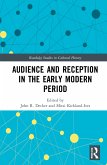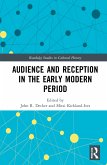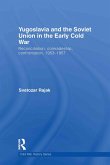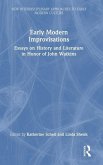Language Dynamics in the Early Modern Period
Herausgeber: Bennett, Karen; Cattaneo, Angelo
Language Dynamics in the Early Modern Period
Herausgeber: Bennett, Karen; Cattaneo, Angelo
- Broschiertes Buch
- Merkliste
- Auf die Merkliste
- Bewerten Bewerten
- Teilen
- Produkt teilen
- Produkterinnerung
- Produkterinnerung
Of interest to linguists, literary scholars and historians, this interdisciplinary volume examines the shifting relationships that existed between the various tongues vying for status in diverse geographical contexts as Latin, the great lingua franca of the Middle Ages, entered into decline.
Andere Kunden interessierten sich auch für
![Audience and Reception in the Early Modern Period Audience and Reception in the Early Modern Period]() Audience and Reception in the Early Modern Period64,99 €
Audience and Reception in the Early Modern Period64,99 €![Audience and Reception in the Early Modern Period Audience and Reception in the Early Modern Period]() Audience and Reception in the Early Modern Period196,99 €
Audience and Reception in the Early Modern Period196,99 €![History Of The Ancient Britons, From The Earliest Period To The Invasion Of The Saxons - Vol I History Of The Ancient Britons, From The Earliest Period To The Invasion Of The Saxons - Vol I]() J. A. GilesHistory Of The Ancient Britons, From The Earliest Period To The Invasion Of The Saxons - Vol I35,99 €
J. A. GilesHistory Of The Ancient Britons, From The Earliest Period To The Invasion Of The Saxons - Vol I35,99 €![Sport and the Transformation of Modern Europe Sport and the Transformation of Modern Europe]() Sport and the Transformation of Modern Europe50,99 €
Sport and the Transformation of Modern Europe50,99 €![The Making of Modern Woman The Making of Modern Woman]() Lynn AbramsThe Making of Modern Woman79,99 €
Lynn AbramsThe Making of Modern Woman79,99 €![Yugoslavia and the Soviet Union in the Early Cold War Yugoslavia and the Soviet Union in the Early Cold War]() Svetozar RajakYugoslavia and the Soviet Union in the Early Cold War206,99 €
Svetozar RajakYugoslavia and the Soviet Union in the Early Cold War206,99 €![Early Modern Improvisations Early Modern Improvisations]() Early Modern Improvisations195,99 €
Early Modern Improvisations195,99 €-
-
-
Of interest to linguists, literary scholars and historians, this interdisciplinary volume examines the shifting relationships that existed between the various tongues vying for status in diverse geographical contexts as Latin, the great lingua franca of the Middle Ages, entered into decline.
Hinweis: Dieser Artikel kann nur an eine deutsche Lieferadresse ausgeliefert werden.
Hinweis: Dieser Artikel kann nur an eine deutsche Lieferadresse ausgeliefert werden.
Produktdetails
- Produktdetails
- Verlag: Routledge
- Seitenzahl: 278
- Erscheinungstermin: 27. Mai 2024
- Englisch
- Abmessung: 229mm x 152mm x 15mm
- Gewicht: 407g
- ISBN-13: 9780367552152
- ISBN-10: 0367552159
- Artikelnr.: 70339768
- Herstellerkennzeichnung
- Libri GmbH
- Europaallee 1
- 36244 Bad Hersfeld
- gpsr@libri.de
- Verlag: Routledge
- Seitenzahl: 278
- Erscheinungstermin: 27. Mai 2024
- Englisch
- Abmessung: 229mm x 152mm x 15mm
- Gewicht: 407g
- ISBN-13: 9780367552152
- ISBN-10: 0367552159
- Artikelnr.: 70339768
- Herstellerkennzeichnung
- Libri GmbH
- Europaallee 1
- 36244 Bad Hersfeld
- gpsr@libri.de
Karen Bennett is Associate Professor in Translation at NOVA University Lisbon, and a researcher with the Centre for English, Translation and Anglo-Portuguese Studies (CETAPS), where she coordinates the Translationality strand. Angelo Cattaneo is Research Fellow at CNR-National Research Council, Rome and Research Associate of CHAM, Nova University, Lisbon.
Introduction: The Great Upheaval - Multilingualism and Lingua Francas in
the Early Modern Period Part 1: Multilingualism and Its Discontents 1.
Multilingual Events in Late Medieval Personal Documentary Texts from the
Winchester Diocese Collection in 1400-1525 2. Croatian Biblical Texts in
the Early Modern Period: A Historical-Sociolinguistic Approach to Language
Change 3. National Myths and Language Status in Early Modern Wales and
Brittany 4. Bernardo de Aldrete's Del origen: Rejecting Multilingualism and
Linguistic Essentialism in Early Modern Spain 5. Multilingualism and
Translation in the Early Modern Low Countries Part 2: The Defence of Latin
6. Should Latin Be Spoken?: The Controversy Between Sanctius Brocensis,
Henry Jason and the Irish Jesuits of Salamanca 7. Pro lingua Latina:
Girolamo Lagomarsini's Oration in Defence of Latin in Eighteenth-Century
Italy 8. Petropolis: The Place of Latin in Early Modern Russia Part 3:
Pidgins, Jargons, Lingua Francas 9. On the Existence of a Mediterranean
Lingua Franca and the Persistence of Language Myths 10. Immortal Passados:
Early Modern England's Italianate Fencing Jargon on Page and Stage 11.
Linguistic Expression of Power and Subalternity in Peixoto's Obra Nova de
Língua Geral de Mina (1741) 12. "Long Time No See": The Use of Chinese
Pidgin English as a Cultural Identity Symbol by the Canton Anglophone
Trading Community. Epilogue: Developing Historical Linguistic Awareness in
a Multilingual World
the Early Modern Period Part 1: Multilingualism and Its Discontents 1.
Multilingual Events in Late Medieval Personal Documentary Texts from the
Winchester Diocese Collection in 1400-1525 2. Croatian Biblical Texts in
the Early Modern Period: A Historical-Sociolinguistic Approach to Language
Change 3. National Myths and Language Status in Early Modern Wales and
Brittany 4. Bernardo de Aldrete's Del origen: Rejecting Multilingualism and
Linguistic Essentialism in Early Modern Spain 5. Multilingualism and
Translation in the Early Modern Low Countries Part 2: The Defence of Latin
6. Should Latin Be Spoken?: The Controversy Between Sanctius Brocensis,
Henry Jason and the Irish Jesuits of Salamanca 7. Pro lingua Latina:
Girolamo Lagomarsini's Oration in Defence of Latin in Eighteenth-Century
Italy 8. Petropolis: The Place of Latin in Early Modern Russia Part 3:
Pidgins, Jargons, Lingua Francas 9. On the Existence of a Mediterranean
Lingua Franca and the Persistence of Language Myths 10. Immortal Passados:
Early Modern England's Italianate Fencing Jargon on Page and Stage 11.
Linguistic Expression of Power and Subalternity in Peixoto's Obra Nova de
Língua Geral de Mina (1741) 12. "Long Time No See": The Use of Chinese
Pidgin English as a Cultural Identity Symbol by the Canton Anglophone
Trading Community. Epilogue: Developing Historical Linguistic Awareness in
a Multilingual World
Introduction: The Great Upheaval - Multilingualism and Lingua Francas in
the Early Modern Period Part 1: Multilingualism and Its Discontents 1.
Multilingual Events in Late Medieval Personal Documentary Texts from the
Winchester Diocese Collection in 1400-1525 2. Croatian Biblical Texts in
the Early Modern Period: A Historical-Sociolinguistic Approach to Language
Change 3. National Myths and Language Status in Early Modern Wales and
Brittany 4. Bernardo de Aldrete's Del origen: Rejecting Multilingualism and
Linguistic Essentialism in Early Modern Spain 5. Multilingualism and
Translation in the Early Modern Low Countries Part 2: The Defence of Latin
6. Should Latin Be Spoken?: The Controversy Between Sanctius Brocensis,
Henry Jason and the Irish Jesuits of Salamanca 7. Pro lingua Latina:
Girolamo Lagomarsini's Oration in Defence of Latin in Eighteenth-Century
Italy 8. Petropolis: The Place of Latin in Early Modern Russia Part 3:
Pidgins, Jargons, Lingua Francas 9. On the Existence of a Mediterranean
Lingua Franca and the Persistence of Language Myths 10. Immortal Passados:
Early Modern England's Italianate Fencing Jargon on Page and Stage 11.
Linguistic Expression of Power and Subalternity in Peixoto's Obra Nova de
Língua Geral de Mina (1741) 12. "Long Time No See": The Use of Chinese
Pidgin English as a Cultural Identity Symbol by the Canton Anglophone
Trading Community. Epilogue: Developing Historical Linguistic Awareness in
a Multilingual World
the Early Modern Period Part 1: Multilingualism and Its Discontents 1.
Multilingual Events in Late Medieval Personal Documentary Texts from the
Winchester Diocese Collection in 1400-1525 2. Croatian Biblical Texts in
the Early Modern Period: A Historical-Sociolinguistic Approach to Language
Change 3. National Myths and Language Status in Early Modern Wales and
Brittany 4. Bernardo de Aldrete's Del origen: Rejecting Multilingualism and
Linguistic Essentialism in Early Modern Spain 5. Multilingualism and
Translation in the Early Modern Low Countries Part 2: The Defence of Latin
6. Should Latin Be Spoken?: The Controversy Between Sanctius Brocensis,
Henry Jason and the Irish Jesuits of Salamanca 7. Pro lingua Latina:
Girolamo Lagomarsini's Oration in Defence of Latin in Eighteenth-Century
Italy 8. Petropolis: The Place of Latin in Early Modern Russia Part 3:
Pidgins, Jargons, Lingua Francas 9. On the Existence of a Mediterranean
Lingua Franca and the Persistence of Language Myths 10. Immortal Passados:
Early Modern England's Italianate Fencing Jargon on Page and Stage 11.
Linguistic Expression of Power and Subalternity in Peixoto's Obra Nova de
Língua Geral de Mina (1741) 12. "Long Time No See": The Use of Chinese
Pidgin English as a Cultural Identity Symbol by the Canton Anglophone
Trading Community. Epilogue: Developing Historical Linguistic Awareness in
a Multilingual World








